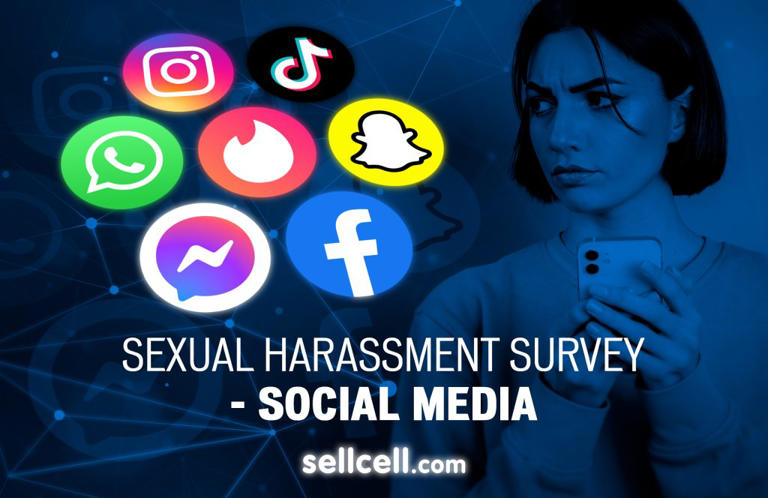40% of Women Experience or Witness Sexual Harassment on Social Media Platforms…
Key Discoveries:
A significant 20.8% of women have personally encountered sexual harassment on social media. 39.7% of women have either experienced or witnessed sexual harassment online on social media platforms. Among female victims of social media sexual harassment, 57% experienced it through Facebook and Facebook Messenger. Out of the women who faced sexual harassment on social media, 79% received unwelcome messages and/or sexual comments. A staggering 68.2% of the surveyed 3,000 women who actively use social media believe that social media companies do not do enough to protect people.
Introduction and Survey Objectives
SellCell, a prominent online mobile phone price comparison site, conducted a survey to examine the issue of online sexual harassment targeting women on social media. The survey, conducted by OnePoll on behalf of SellCell, gathered responses from 3,000 UK women who actively use social media and related applications. Its purpose was to determine the prevalence of sexual harassment experienced by women and their observations of such incidents.
Main Findings
(Please be advised that some questions and answers in this survey involve sensitive subjects.)
Out of the 3,000 UK women who responded to the survey and use social media, 40% have either experienced or witnessed sexual harassment on social media platforms or applications. Among the respondents, 21% personally encountered sexual harassment on social media platforms or applications. Of the 624 women who personally experienced sexual harassment on social media, 57% stated that it occurred through Facebook or Facebook Messenger. 79% of those who experienced online harassment reported receiving unwelcome sexual comments or messages. 76% of women who faced sexual harassment on social media took action by blocking the offender or offenders. 32% of victims of social media sexual harassment reported experiencing long-term effects such as feelings of violation and/or intimidation. Regarding the 2,342 women who did not experience sexual harassment on social media, the majority (69%) attributed their safety to being selective about whom they follow or accept friend requests from. 68.2% of the 3,000 female social media users polled believe that social media platforms do not sufficiently protect people from online sexual harassment.
Summary of Survey Questions
SellCell and OnePoll posed the following questions to 3,000 UK women who use social media, concerning sexual harassment through social media platforms or applications. Please note that some questions and responses contain explicit or sensitive content.
Question 1) How would you best describe your experience of sexual harassment on a social media platform or application?
Among the respondents, 39.7% (1,190) stated that they had either personally experienced sexual harassment or witnessed it online on social media platforms or applications. Of the 3,000 participants, 20.8% (624) revealed that they had personally experienced sexual harassment on a social platform or application. This leaves 79.2% who have never personally encountered sexual harassment while using a social media platform or application.
Question 2) (For those who have never personally experienced sexual harassment through a social media platform or application) Why do you think you have avoided personal experiences of sexual harassment on social media? [Select all that apply]
In response to this question, 69% (1,605) of the 2,342 women who have not personally experienced social media sexual harassment stated that they are cautious about whom they follow or accept friend requests from. 42% of respondents keep their social media accounts private to avoid harassment, while 41% refrain from sharing personal information due to mistrust in the platforms’ ability to keep them safe. 32% use social media primarily for news and updates rather than socializing, and 5% restrict their social media usage to work or business purposes.
Question 3) (For those who have personally experienced sexual harassment through a social media platform or application) On which social media platforms or applications have you personally experienced sexual harassment? [Select all that apply]
57% of the 624 women who experienced sexual harassment on social media identified Facebook and/or Facebook Messenger as the platforms or applications where they faced harassment. 37% of those 624 participants mentioned Instagram as the app or platform, while 26% cited dating apps such as Tinder or Hinge as culprits for sexual harassment. 4% of the respondents who encountered online sexual harassment reported LinkedIn, a professional networking platform, as the source of the harassment.
Question 4) (For those who have personally experienced sexual harassment through a social media platform or application) What types of sexual harassment have you personally experienced on social media platforms or applications? [Select all that apply]
The majority (79%) of women who experienced sexual harassment on social media reported unwelcome sexual comments or messages as the primary form of harassment. 59% of victims indicated that friend requests or invitations from strangers made them feel uncomfortable. 48% of those who fell prey to offenders stated that the offenders sent them pornographic photos or videos. 9% of victims of online social media sexual harassment reported threats of sexual violence as a form of harassment.
Question 5) (For those who have personally experienced sexual harassment through a social media platform or application) Did you report or take any action when you personally experienced sexual harassment on social media? [Select all that apply]
Out of the 624 women who were sexually harassed on social media, 76% of them took action by blocking the individual who harassed them. 42% of the respondents reported the offender to the respective social media app or platform where they experienced abuse. 5% escalated the matter to the police, but unfortunately, 11% of respondents did nothing as they believed neither the platform, app, nor the police would take action against the offender.
Question 6) (For those who have personally experienced sexual harassment through a social media platform or application) What long-term effects, if any, have you experienced as a result of the online sexual harassment you faced? [Select all that apply]
Of the women who answered yes to the first question, 32% mentioned feeling violated and/or intimidated as a result of the experience. 21% stated that the sexual harassment made them doubt their personal appearance, and 19% reported suffering from anxiety due to the harassment. The sexual harassment affected 10% of victims’ current intimate relationships, while 3% experienced negative consequences in their careers as a result of the offender’s actions.
Question 7) (For all respondents) How would you best describe your experience of sexual harassment through a social media platform or application?
Of the 3,000 women surveyed, a vast majority of 68.2% (2,045 women) believe that social media companies do not take sufficient action against sexual harassment on their platforms or applications. Only 7.8% of respondents think that social media companies are doing enough, while 24.0% were unsure if companies adequately protect their female users from sexual harassment.

